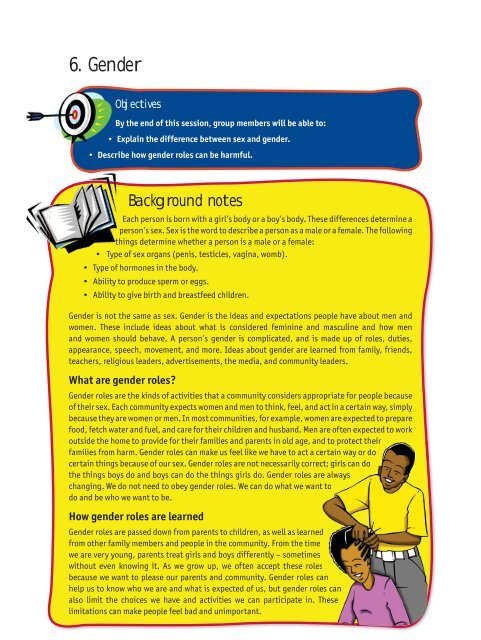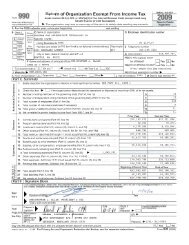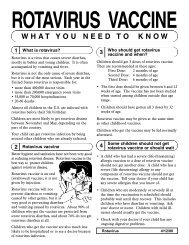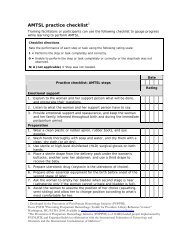Tuko Pamoja: A Guide for Peer Educators (entire - Path
Tuko Pamoja: A Guide for Peer Educators (entire - Path
Tuko Pamoja: A Guide for Peer Educators (entire - Path
Create successful ePaper yourself
Turn your PDF publications into a flip-book with our unique Google optimized e-Paper software.
6. Gender<br />
Objectives<br />
By the end of this session, group members will be able to:<br />
• Explain the difference between sex and gender.<br />
• Describe how gender roles can be harmful.<br />
Background notes<br />
Each person is born with a girl’s body or a boy’s body. These differences determine a<br />
person’s sex. Sex is the word to describe a person as a male or a female. The following<br />
things determine whether a person is a male or a female:<br />
• Type of sex organs (penis, testicles, vagina, womb).<br />
• Type of hormones in the body.<br />
• Ability to produce sperm or eggs.<br />
• Ability to give birth and breastfeed children.<br />
Gender is not the same as sex. Gender is the ideas and expectations people have about men and<br />
women. These include ideas about what is considered feminine and masculine and how men<br />
and women should behave. A person’s gender is complicated, and is made up of roles, duties,<br />
appearance, speech, movement, and more. Ideas about gender are learned from family, friends,<br />
teachers, religious leaders, advertisements, the media, and community leaders.<br />
What are gender roles?<br />
Gender roles are the kinds of activities that a community considers appropriate <strong>for</strong> people because<br />
of their sex. Each community expects women and men to think, feel, and act in a certain way, simply<br />
because they are women or men. In most communities, <strong>for</strong> example, women are expected to prepare<br />
food, fetch water and fuel, and care <strong>for</strong> their children and husband. Men are often expected to work<br />
outside the home to provide <strong>for</strong> their families and parents in old age, and to protect their<br />
families from harm. Gender roles can make us feel like we have to act a certain way or do<br />
certain things because of our sex. Gender roles are not necessarily correct; girls can do<br />
the things boys do and boys can do the things girls do. Gender roles are always<br />
changing. We do not need to obey gender roles. We can do what we want to<br />
do and be who we want to be.<br />
How gender roles are learned<br />
Gender roles are passed down from parents to children, as well as learned<br />
from other family members and people in the community. From the time<br />
we are very young, parents treat girls and boys differently – sometimes<br />
without even knowing it. As we grow up, we often accept these roles<br />
because we want to please our parents and community. Gender roles can<br />
help us to know who we are and what is expected of us, but gender roles can<br />
also limit the choices we have and activities we can participate in. These<br />
limitations can make people feel bad and unimportant.

















